Abstract
This paper reviews recent psychological studies of patients with the irritable bowel syndrome (IBS) or 'functional abdominal pain'. Many studies have used unreliable or invalid methods of assessment and some have confused personality with treatable psychiatric illness. Reliable and valid measures have indicated that 40-50% of patients with recently diagnosed functional abdominal pain have demonstrable psychiatric illness; these patients have a worse prognosis than those who are psychologically normal. When psychiatric disorder is diagnosed in a patient with IBS there are three possibilities: (1) The patient may have developed abdominal and psychiatric symptoms simultaneously in which case treatment of the latter may relieve the bowel symptoms. (2) Psychiatric disorder may precipitate increased concern about bowel symptoms, and consequent attendance at the gastroenterology clinic, of those with chronic mild symptoms. In this case it is illness behaviour, rather than abdominal symptoms, that is caused by the anxiety/depression. (3) Those with chronic neurotic symptoms as part of their personality must be screened for organic disease if they have a fresh onset of bowel symptoms; but they are at high risk of becoming persistent clinic attenders. Further research is needed to clarify when psychological abnormalities play a role in the aetiology of IBS and when they are coincidental, but lead to illness behaviour. The role of psychological factors in the aetiology of the irritable bowel syndrome (IBS) is far from clear, but a review of the literature suggests that some consistent patterns are emerging in spite of methodological problems. There have been three major defects with studies that have linked IBS with neurotic symptomatology. First, the measurement of psychological factors has generally been imprecise. Second, most studies have considered IBS patients as a single group, without making allowance for differing symptom patterns. Third, conclusions have been drawn about hospital samples and extrapolated to all IBS subjects, without taking account of factors which affect consulting behaviour. Most studies have been concerned with psychological factors so these will be considered in most detail.
Full text
PDF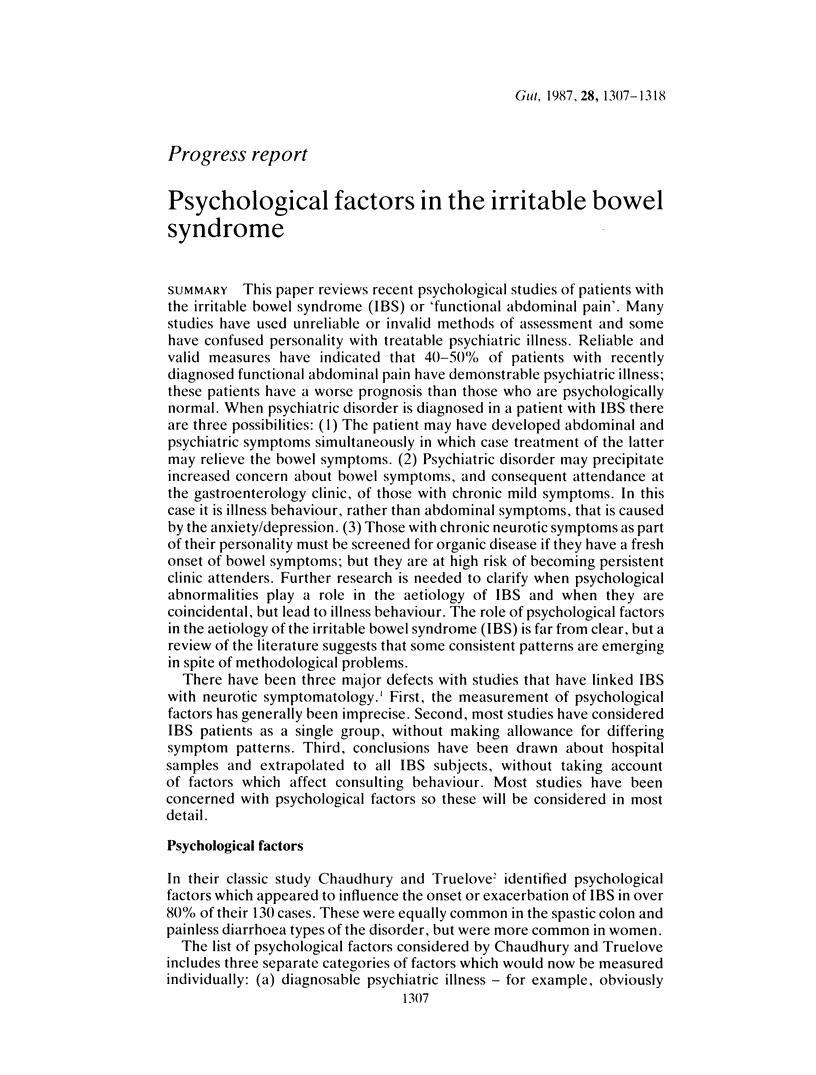
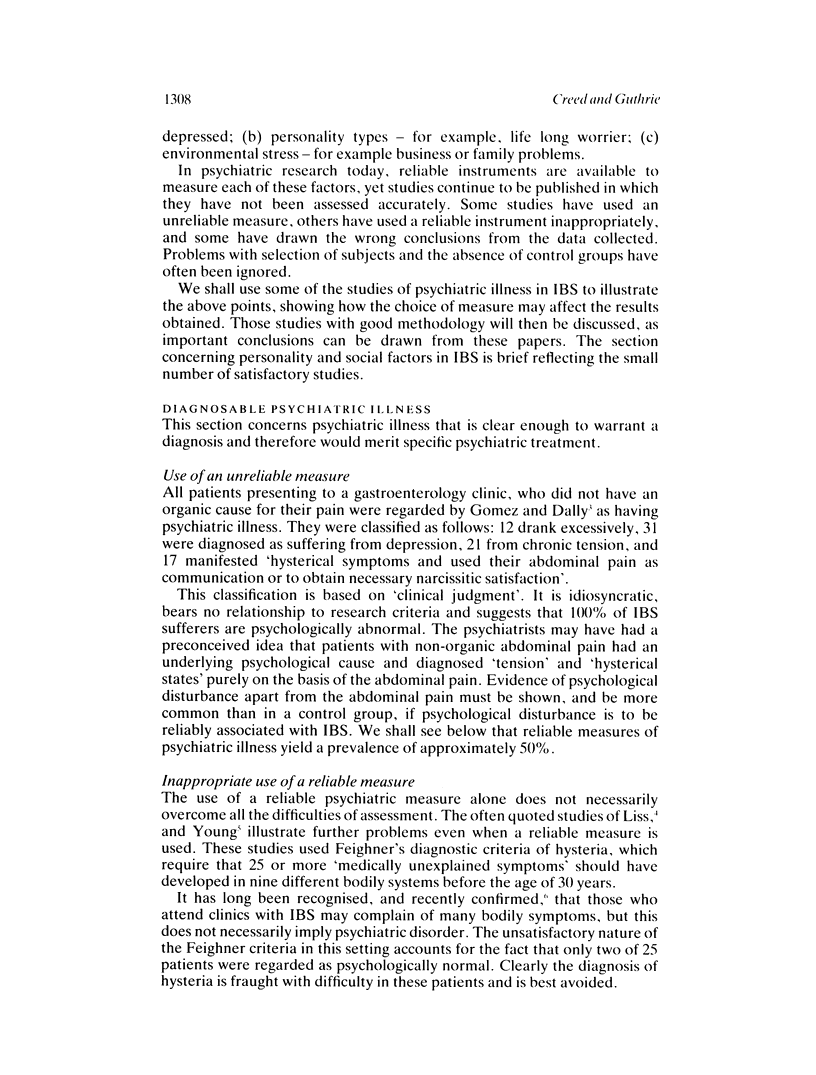
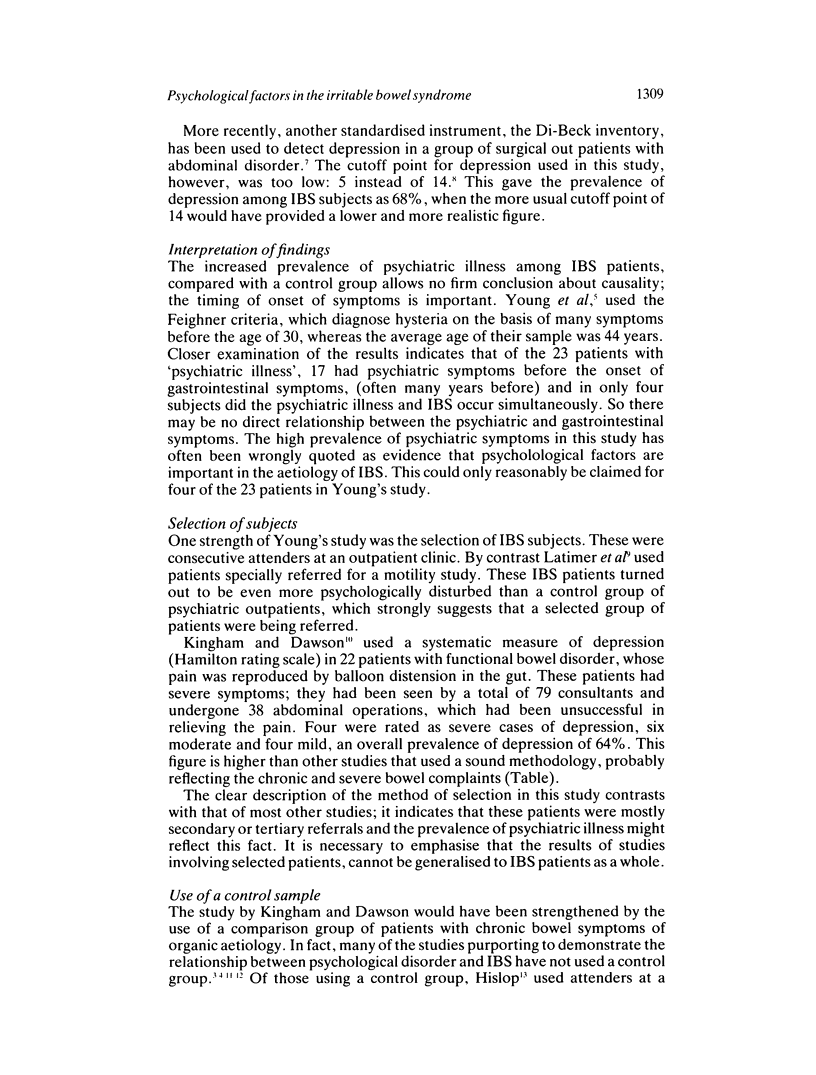
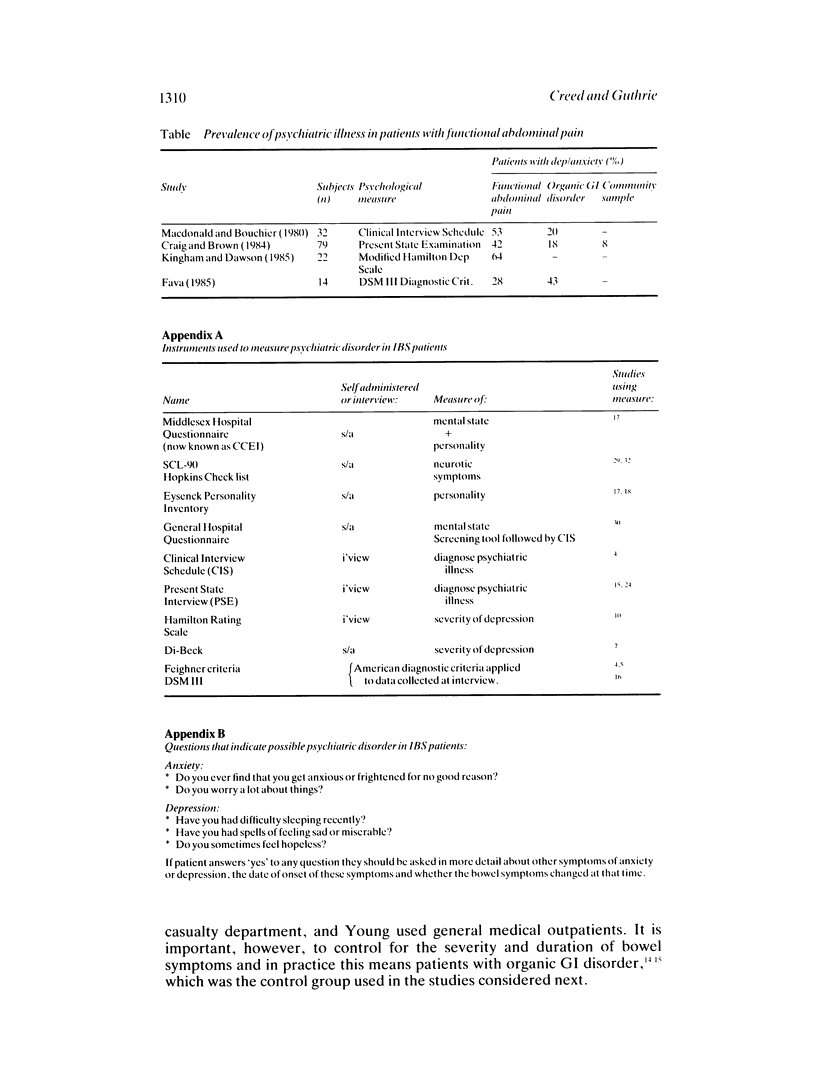
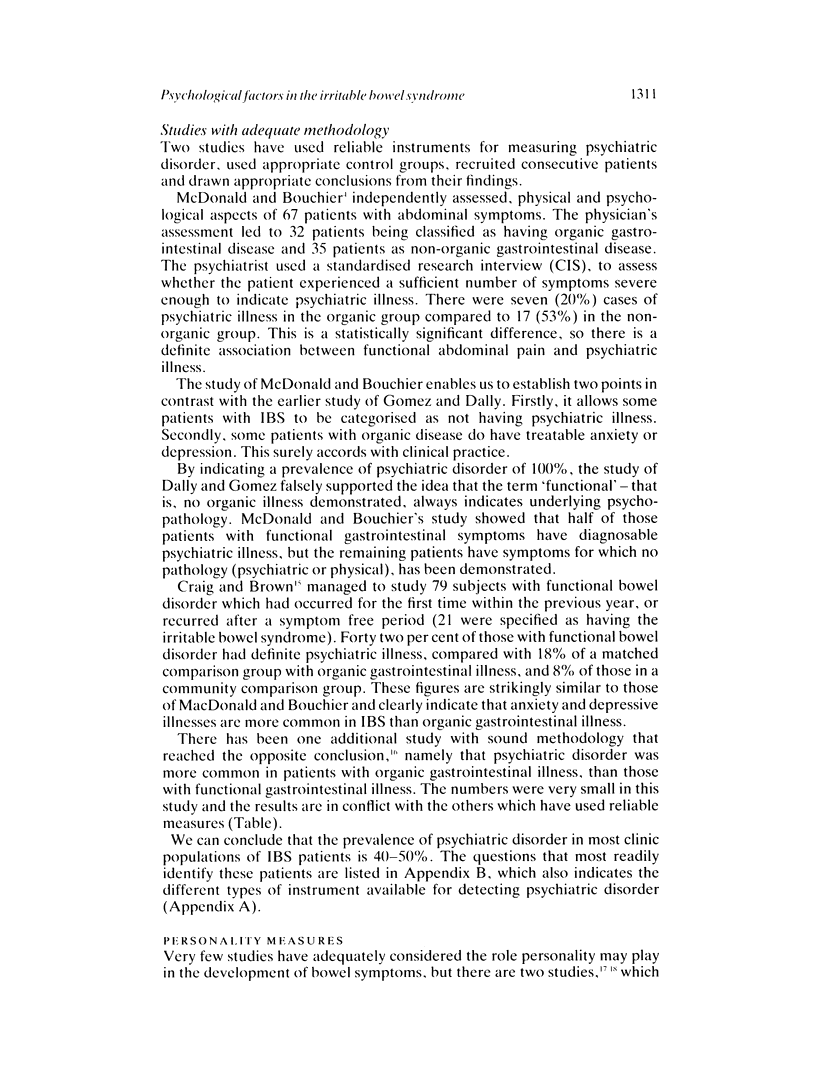
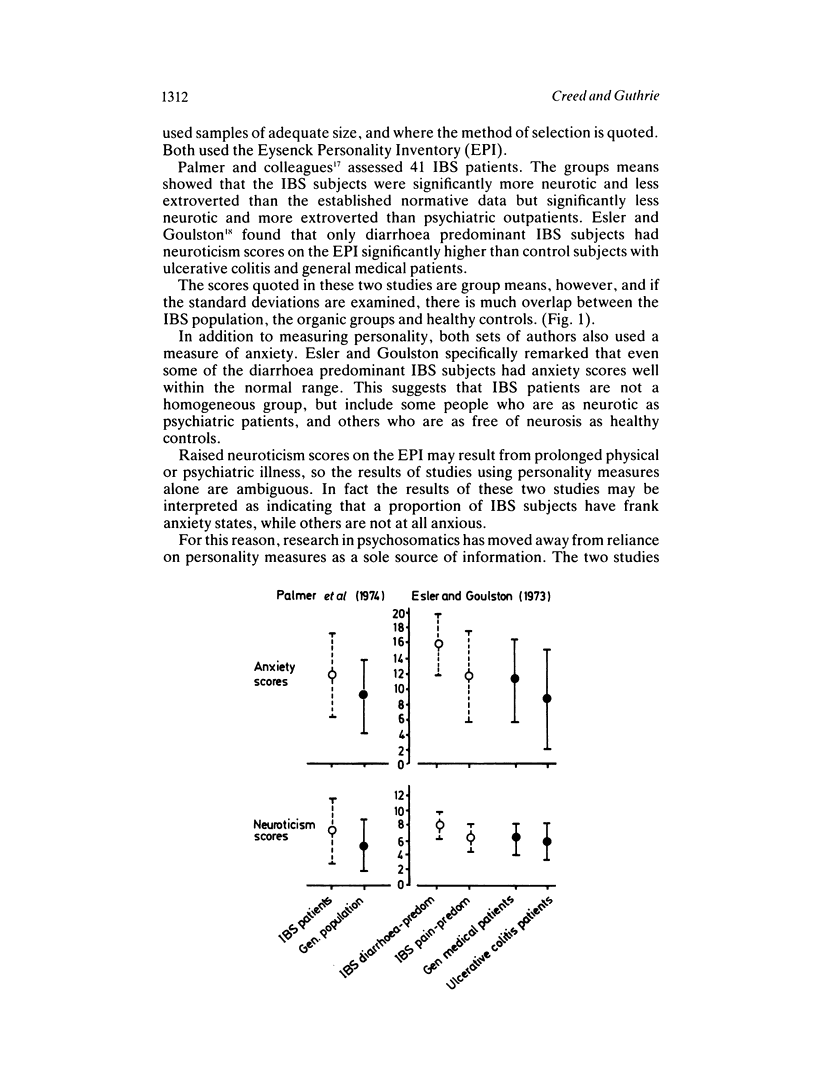
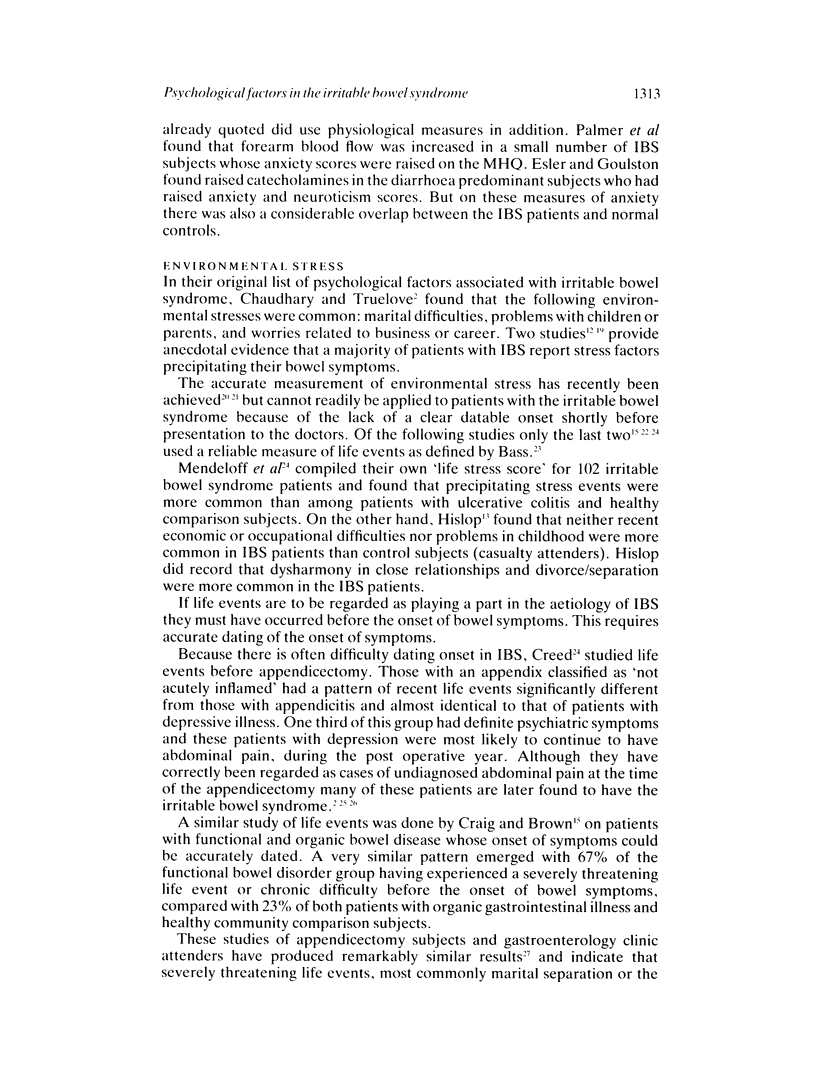
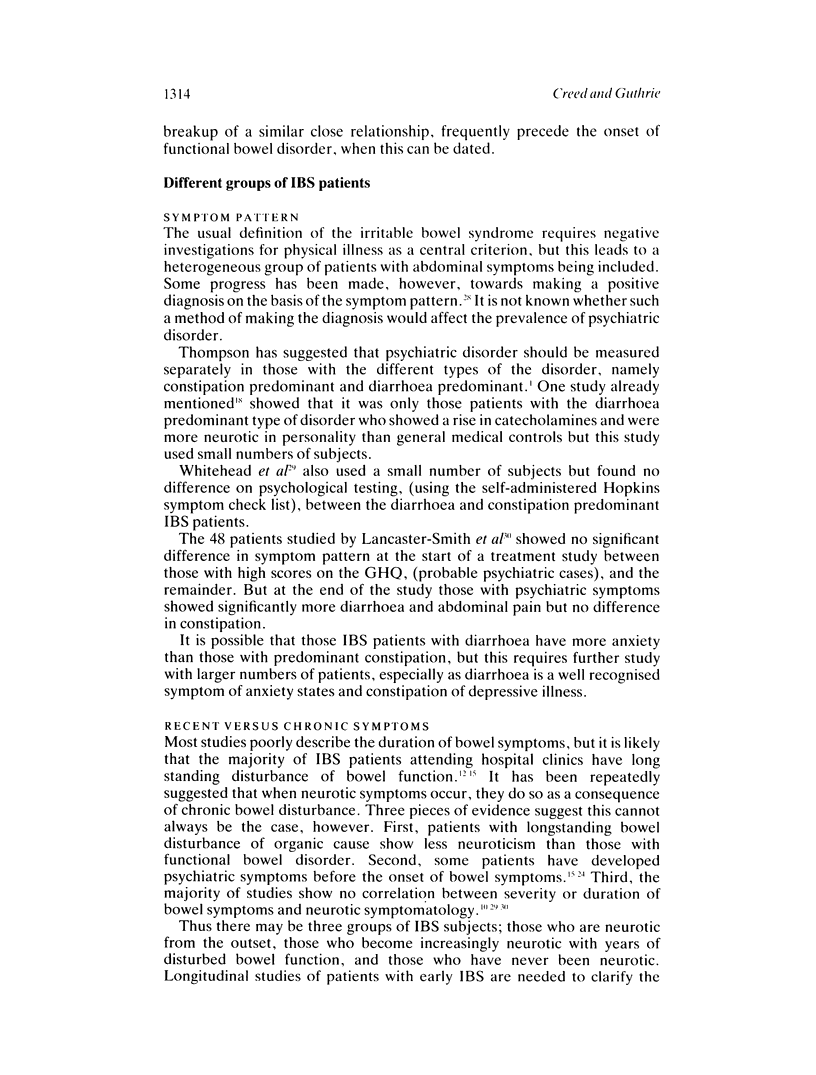
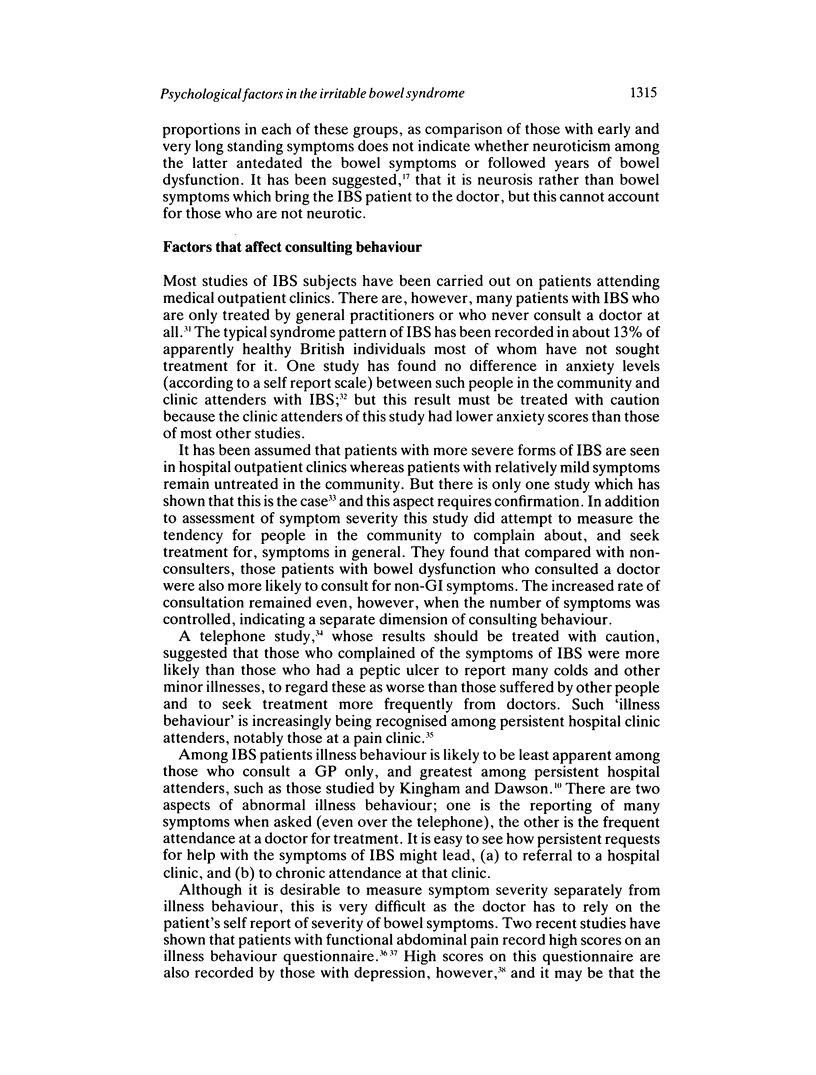
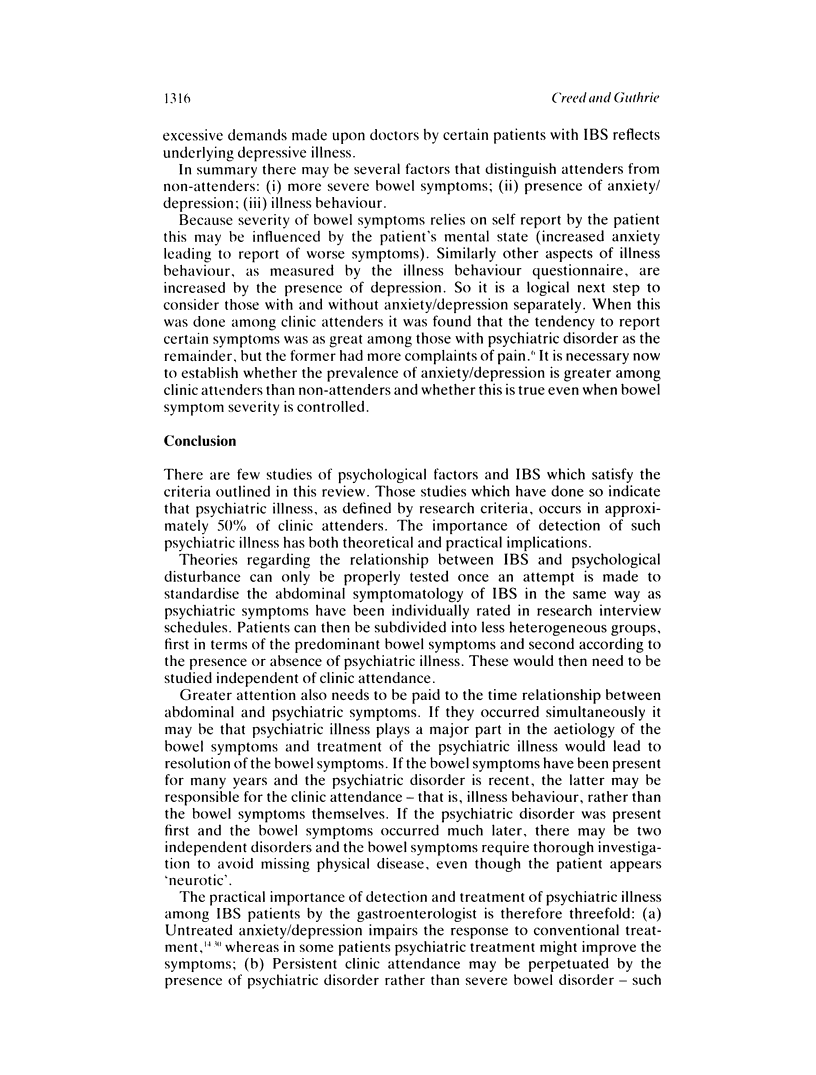
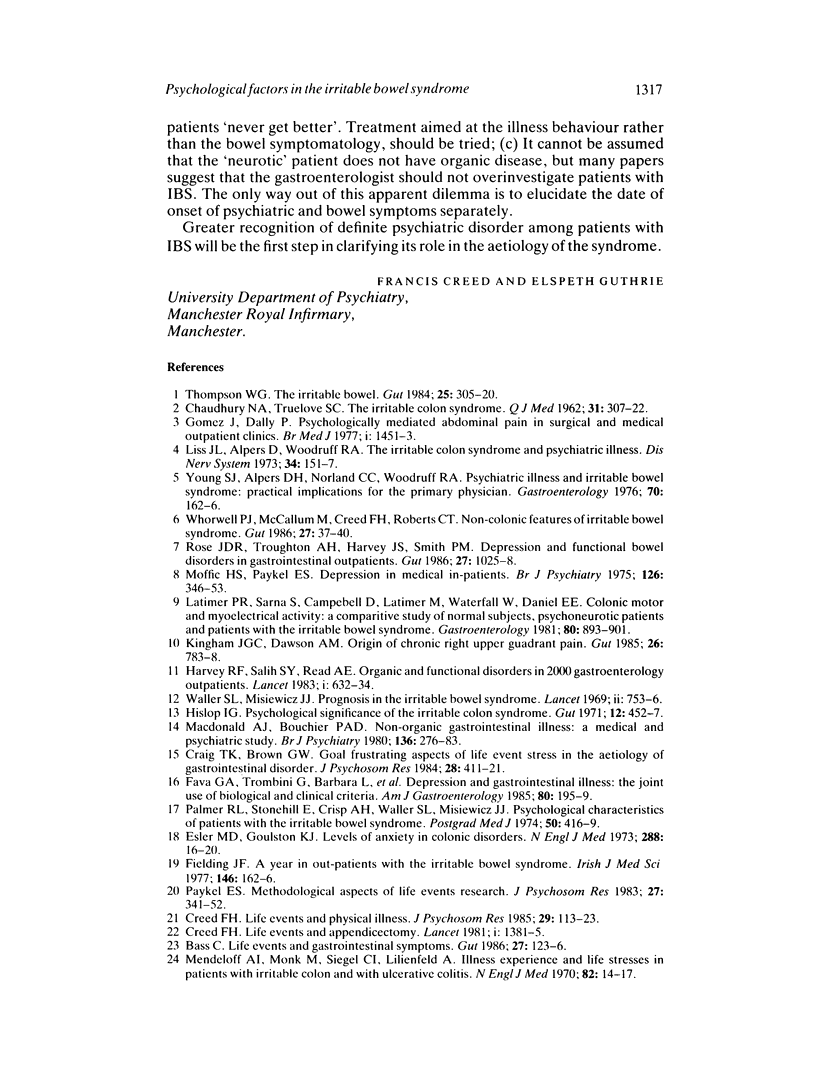
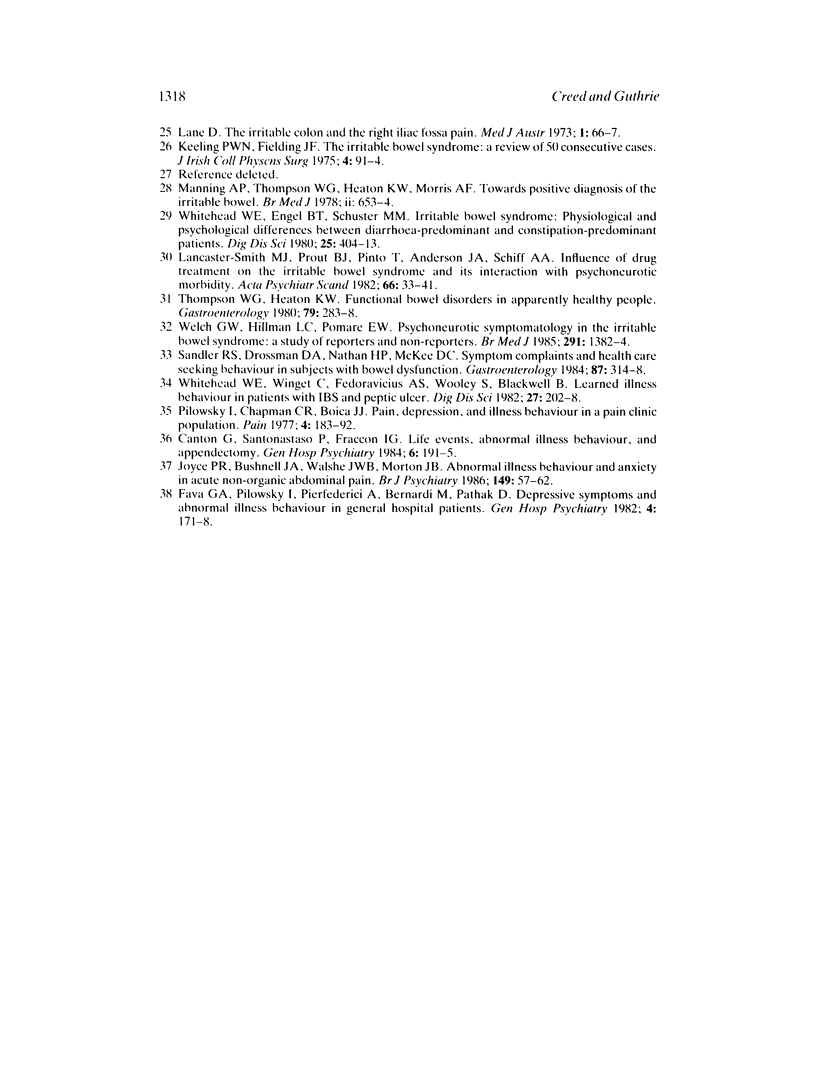
Selected References
These references are in PubMed. This may not be the complete list of references from this article.
- Bass C. Life events and gastrointestinal symptoms. Gut. 1986 Feb;27(2):123–126. doi: 10.1136/gut.27.2.123. [DOI] [PMC free article] [PubMed] [Google Scholar]
- CHAUDHARY N. A., TRUELOVE S. C. The irritable colon syndrome. A study of the clinical features, predisposing causes, and prognosis in 130 cases. Q J Med. 1962 Jul;31:307–322. [PubMed] [Google Scholar]
- Canton G., Santonastaso P., Fraccon I. G. Life events, abnormal illness behavior, and appendectomy. Gen Hosp Psychiatry. 1984 Jul;6(3):191–195. doi: 10.1016/0163-8343(84)90039-2. [DOI] [PubMed] [Google Scholar]
- Craig T. K., Brown G. W. Goal frustration and life events in the aetiology of painful gastrointestinal disorder. J Psychosom Res. 1984;28(5):411–421. doi: 10.1016/0022-3999(84)90073-4. [DOI] [PubMed] [Google Scholar]
- Creed F. Life events and appendicectomy. Lancet. 1981 Jun 27;1(8235):1381–1385. doi: 10.1016/s0140-6736(81)92567-8. [DOI] [PubMed] [Google Scholar]
- Creed F. Life events and physical illness. J Psychosom Res. 1985;29(2):113–123. doi: 10.1016/0022-3999(85)90032-7. [DOI] [PubMed] [Google Scholar]
- Esler M. D., Goulston K. J. Levels of anxiety in colonic disorders. N Engl J Med. 1973 Jan 4;288(1):16–20. doi: 10.1056/NEJM197301042880104. [DOI] [PubMed] [Google Scholar]
- Fava G. A., Pilowsky I., Pierfederici A., Bernardi M., Pathak D. Depressive symptoms and abnormal illness behavior in general hospital patients. Gen Hosp Psychiatry. 1982 Sep;4(3):171–178. doi: 10.1016/0163-8343(82)90053-6. [DOI] [PubMed] [Google Scholar]
- Fava G. A., Trombini G., Barbara L., Bernardi M., Grandi S., Callegari C., Miglioli M. Depression and gastrointestinal illness: the joint use of biological and clinical criteria. Am J Gastroenterol. 1985 Mar;80(3):195–199. [PubMed] [Google Scholar]
- Fielding J. F. A year in out-patients with the irritable bowel syndrome. Ir J Med Sci. 1977 Jun;146(6):162–166. doi: 10.1007/BF03030953. [DOI] [PubMed] [Google Scholar]
- Gomez J., Dally P. Psychologically mediated abdominal pain in surgical and medical outpatients clinics. Br Med J. 1977 Jun 4;1(6074):1451–1453. doi: 10.1136/bmj.1.6074.1451. [DOI] [PMC free article] [PubMed] [Google Scholar]
- Harvey R. F., Salih S. Y., Read A. E. Organic and functional disorders in 2000 gastroenterology outpatients. Lancet. 1983 Mar 19;1(8325):632–634. doi: 10.1016/s0140-6736(83)91802-0. [DOI] [PubMed] [Google Scholar]
- Hislop I. G. Psychological significance of the irritable colon syndrome. Gut. 1971 Jun;12(6):452–457. doi: 10.1136/gut.12.6.452. [DOI] [PMC free article] [PubMed] [Google Scholar]
- Joyce P. R., Bushnell J. A., Walshe J. W., Morton J. B. Abnormal illness behaviour and anxiety in acute non-organic abdominal pain. Br J Psychiatry. 1986 Jul;149:57–62. doi: 10.1192/bjp.149.1.57. [DOI] [PubMed] [Google Scholar]
- Kingham J. G., Dawson A. M. Origin of chronic right upper quadrant pain. Gut. 1985 Aug;26(8):783–788. doi: 10.1136/gut.26.8.783. [DOI] [PMC free article] [PubMed] [Google Scholar]
- Lancaster-Smith M. J., Prout B. J., Pinto T., Anderson J. A., Schiff A. A. Influence of drug treatment on the irritable bowel syndrome and its interaction with psychoneurotic morbidity. Acta Psychiatr Scand. 1982 Jul;66(1):33–41. doi: 10.1111/j.1600-0447.1982.tb00912.x. [DOI] [PubMed] [Google Scholar]
- Latimer P., Sarna S., Campbell D., Latimer M., Waterfall W., Daniel E. E. Colonic motor and myoelectrical activity: a comparative study of normal subjects, psychoneurotic patients, and patients with irritable bowel syndrome. Gastroenterology. 1981 May;80(5 Pt 1):893–901. [PubMed] [Google Scholar]
- MacDonald A. J., Bouchier I. A. Non-organic gastrointestinal illness: a medical and psychiatric study. Br J Psychiatry. 1980 Mar;136:276–283. doi: 10.1192/bjp.136.3.276. [DOI] [PubMed] [Google Scholar]
- Manning A. P., Thompson W. G., Heaton K. W., Morris A. F. Towards positive diagnosis of the irritable bowel. Br Med J. 1978 Sep 2;2(6138):653–654. doi: 10.1136/bmj.2.6138.653. [DOI] [PMC free article] [PubMed] [Google Scholar]
- Mendeloff A. I., Monk M., Siegel C. I., Lilienfeld A. Illness experience and life stresses in patients with irritable colon and with ulcerative colitis. An epidemiologic study of ulcerative colitis and regional enteritis in Baltimore, 1960-1964. N Engl J Med. 1970 Jan 1;282(1):14–17. doi: 10.1056/NEJM197001012820104. [DOI] [PubMed] [Google Scholar]
- Moffic H. S., Paykel E. S. Depression in medical in-patients. Br J Psychiatry. 1975 Apr;126:346–353. doi: 10.1192/bjp.126.4.346. [DOI] [PubMed] [Google Scholar]
- Palmer R. L., Stonehill E., Crisp A. H., Waller S. L., Misiewicz J. J. Psychological characteristics of patients with the irritable bowel syndrome. Postgrad Med J. 1974 Jul;50(585):416–419. doi: 10.1136/pgmj.50.585.416. [DOI] [PMC free article] [PubMed] [Google Scholar]
- Paykel E. S. Methodological aspects of life events research. J Psychosom Res. 1983;27(5):341–352. doi: 10.1016/0022-3999(83)90065-x. [DOI] [PubMed] [Google Scholar]
- Pilowsky I., Chapman C. R., Bonica J. J. Pain, depression, and illness behavior in a pain clinic population. Pain. 1977 Dec;4(2):183–192. doi: 10.1016/0304-3959(77)90132-4. [DOI] [PubMed] [Google Scholar]
- Rose J. D., Troughton A. H., Harvey J. S., Smith P. M. Depression and functional bowel disorders in gastrointestinal outpatients. Gut. 1986 Sep;27(9):1025–1028. doi: 10.1136/gut.27.9.1025. [DOI] [PMC free article] [PubMed] [Google Scholar]
- Sandler R. S., Drossman D. A., Nathan H. P., McKee D. C. Symptom complaints and health care seeking behavior in subjects with bowel dysfunction. Gastroenterology. 1984 Aug;87(2):314–318. [PubMed] [Google Scholar]
- Thompson W. G., Heaton K. W. Functional bowel disorders in apparently healthy people. Gastroenterology. 1980 Aug;79(2):283–288. [PubMed] [Google Scholar]
- Thompson W. G. The irritable bowel. Gut. 1984 Mar;25(3):305–320. doi: 10.1136/gut.25.3.305. [DOI] [PMC free article] [PubMed] [Google Scholar]
- Welch G. W., Hillman L. C., Pomare E. W. Psychoneurotic symptomatology in the irritable bowel syndrome: a study of reporters and non-reporters. Br Med J (Clin Res Ed) 1985 Nov 16;291(6506):1382–1384. doi: 10.1136/bmj.291.6506.1382. [DOI] [PMC free article] [PubMed] [Google Scholar]
- Whitehead W. E., Engel B. T., Schuster M. M. Irritable bowel syndrome: physiological and psychological differences between diarrhea-predominant and constipation-predominant patients. Dig Dis Sci. 1980 Jun;25(6):404–413. doi: 10.1007/BF01395503. [DOI] [PubMed] [Google Scholar]
- Whitehead W. E., Winget C., Fedoravicius A. S., Wooley S., Blackwell B. Learned illness behavior in patients with irritable bowel syndrome and peptic ulcer. Dig Dis Sci. 1982 Mar;27(3):202–208. doi: 10.1007/BF01296915. [DOI] [PubMed] [Google Scholar]
- Whorwell P. J., McCallum M., Creed F. H., Roberts C. T. Non-colonic features of irritable bowel syndrome. Gut. 1986 Jan;27(1):37–40. doi: 10.1136/gut.27.1.37. [DOI] [PMC free article] [PubMed] [Google Scholar]
- Young S. J., Alpers D. H., Norland C. C., Woodruff R. A., Jr Psychiatric illness and the irritable bowel syndrome. Practical implications for the primary physician. Gastroenterology. 1976 Feb;70(2):162–166. [PubMed] [Google Scholar]


